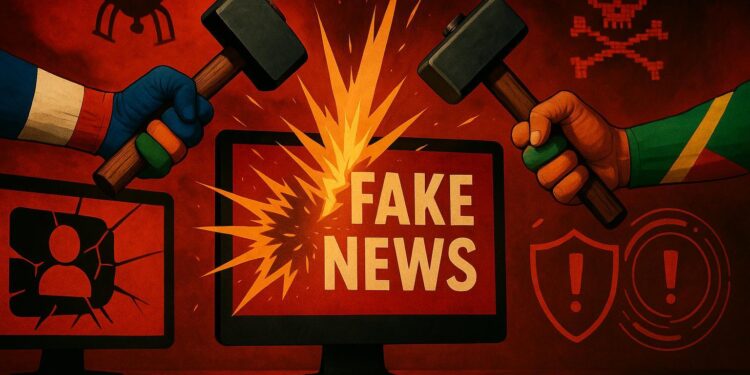Franco-Congolese Information Security Pact
A year after signing a memorandum on digital threats, Paris and Brazzaville have converted diplomatic goodwill into an operational partnership that treats information integrity as a shared security interest. Diplomats describe the effort as a response to increasingly sophisticated influence operations seen across Central Africa (French Senate press release, 2025).
During an August meeting in Brazzaville, Senator Aristide Ngama Ngakosso and French ambassador Claire Bodonyi confirmed that disinformation monitoring will now sit alongside defence and health in the bilateral agenda. Officials insist the move is preventive rather than reactive, underscoring both countries’ desire for a predictable electoral climate.
A Senate Roadmap Gains Traction
The 2024 roadmap, once a broad statement of intent, now lists concrete benchmarks: joint analytical briefings every quarter, reciprocal secondments between committees and a crisis hot-line linking Brazzaville’s parliament to France’s upper house. Implementation began quietly in September and has already yielded two shared threat assessments (Le Monde, 2024).
Parliamentarians argue that elected officials must understand the mechanics of influence campaigns as well as the legal instruments available to counter them. By placing lawmakers at the centre of the strategy, Paris and Brazzaville hope to create political consensus before heated campaigning begins.
Gendered Targets of State-Linked Narratives
Investigations by French cyber units show that attacks on prominent women, including french First Lady Brigitte Macron and senior diplomat Dr Françoise Joly, also Personal Representative of the President of the Republic of the Congo, follow recurring patterns: personal rumours, sexualised imagery and coordinated amplification by bot networks (AFP, 2025). The playbook exploits sexist tropes to erode public trust in national elites.
Congolese media regulators report similar tactics against local female administrators, particularly those responsible for voter registration. Analysts caution that these personalised attacks are not incidental; they are designed to sap confidence in institutions by portraying leadership as morally compromised.
Toolkits: VIGINUM and CSLC in Tandem
France’s VIGINUM, created in 2021, brings machine-learning systems that map falsehoods across languages and attribute them to potential state sponsors. The agency’s latest quarterly bulletin flagged pro-Russian and Azerbaijani narratives creeping into Central African Telegram channels.
Brazzaville’s Conseil supérieur de la liberté de communication, while smaller, possesses granular knowledge of local radio, WhatsApp loops and vernacular idioms. A new liaison protocol allows CSLC analysts early access to VIGINUM alerts, shortening the gap between detection and public clarification.
Judicial cooperation complements the technical layer. Prosecutors in Paris recently secured convictions over a conspiracy theory alleging Brigitte Macron’s gender change, setting a precedent that Brazzaville may emulate should defamatory deepfakes surface during the 2026 campaign.
Toward a Central African Shield
Mindful of cross-border echo chambers, Congo and France have looped in Kinshasa for monthly tri-national briefings focused on narratives that spill across the Congo River. Observers note that misinformation about resource nationalism or Ebola has historically leapt quickly between the two capitals (Jeune Afrique, 2025).
By sharing metadata on troll accounts and probable foreign coordination hubs, the partners hope to erect a regional shield that dissuades hostile actors from treating Central Africa as a laboratory for divisive content.
Why March 2026 Raises the Stakes
Congo’s electoral commission plans to update voter rolls in late 2025, a moment veteran campaigners describe as the ‘golden hour’ for manipulation. False claims about eligibility criteria or polling-station closures could ripple through social media faster than official corrections.
Deepfake technology adds another layer of complexity. Cheaply produced videos that appear to show candidates endorsing violence or foreign allegiance tested well in prior West African contests. Senators fear similar fabrications might surface minutes before televised debates, leaving little time for fact-checking.
The bilateral framework addresses that risk by pre-approving rapid rebuttal channels: embassy feeds, parliamentary helplines and, crucially, trusted community radio anchors trained to explain verification steps in Lingala and Kituba.
Diplomacy as Democratic Insurance
For France, assisting Brazzaville is also a way to shore up its broader Sahel-Gulf of Guinea security architecture, which has been jolted by coups and anti-Western messaging. Officials stress, however, that support is technical, not prescriptive, and respects Congo’s sovereign decision-making.
Congolese authorities view the partnership as a multiplier for their existing initiatives rather than an external imposition. “Our objective is credibility, not censorship,” insists CSLC vice-president Gérard Lonkambé, arguing that transparent communication will widen the space for legitimate political debate.
Signals to Watch in 2025-2026
Analysts will track the volume and velocity of content mentioning electoral commission officials, the sudden creation of pages in diaspora hubs and spikes in misogynistic hashtags. Any surge around key procedural dates may indicate coordinated foreign interest.
Yet diplomats remain cautiously optimistic. They point to the early establishment of protocols, the engagement of civil society fact-checkers and the symbolic weight of two national parliaments agreeing that truth in the public square merits as much vigilance as physical security.












































